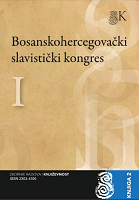Проксемите како идеологеми
Proxemics as Ideologemes
Author(s): Vesna Mojsova-ChepishevskaSubject(s): Comparative Study of Literature, Bosnian Literature, Croatian Literature, Macedonian Literature, Theory of Literature, Identity of Collectives, Sociology of Literature
Published by: Slavistički komitet BiH
Keywords: Proxemic; ideologeme; Pajo Avirovic (Џахиз и истребувачите на кучиња); Tatjana Gromaca (Crnac); Miljenko Jergovic (Sarajevski Marlboro); Fadila Nura Haver (Kad umrem da se smijem);
Summary/Abstract: The spatial signs, or the proxemics in the work by Pajo Avirovic (Џахиз и истребувачите на кучиња), as well as in those by Tatjana Gromaca (Crnac), Miljenko Jergovic (Sarajevski Marlboro) and Fadila Nura Haver (Kad umrem da se smijem) are revealed through careful reading, which, on the other hand, points to the existence of two systems of signs. One is external, and as such is as foreign / isolated as it is harshly real, while the other is internal and is perceived as native / personal, as well as virtual. These signs are infused with meaning in an ideological sense and are incorporated in a whole ideologematic idea, and thus, the external sign becomes an ideologeme for foreign country, while the internal sign becomes an ideologeme for native country within the main question: Where is / What is my native country?, and also a question: Who I’m? In an even deeper analysis (as a mytheme), the external sign is closely connected to the adult, through the growing up process, especially the act of self-awareness as initiation, while the internal sign is connected to the child itself.
Journal: Bosanskohercegovački slavistički kongres
- Issue Year: I/2012
- Issue No: 2
- Page Range: 375-384
- Page Count: 10
- Language: Macedonian

